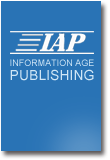
Innovation Trends and Educational Technology in Higher Education
Edited by:
Roberto Alonso González Lezcano, Universidad CEU San Pablo
Şenol Orakcı, Aksaray University
Call For Chapter Proposals
BOOK DESCRIPTION:In a digital context, education is continuously adapting to new scenarios and training proposals. This process means that students stop being a passive subject and become the protagonist of their learning, for which it is necessary to incorporate different resources and tools that allow them to acquire new skills and solve problems similar to those that occur in real life.
New approaches in EduTech and ID models continue to emerge for solving new learning problems. New thoughts and events have revealed how important educational technology and instructional design processes are in every learning environment and family life, as a very basic need, which cannot be noticed, especially during the pandemic period. This situation led to the development of new ideas, learning analytics, and learning design models, from face-to-face teaching to teaching outside the classroom. The most important of these, in addition to the use of instructional technologies, revealed how the principles of instructional design can be used effectively in distance learning and online learning.
The rapid advances in educational technology pose a great challenge for educators to stay abreast of the latest trends and for educational institutions who need to continuously update their digital infrastructure. The recent COVID-19 pandemic has caused the adoption rate of some of these technologies to be even faster than usual.
The aim of book is to offer readers information regarding conventional teaching styles and remote teaching, online learning styles, as well as a clear vision of how to apply learning and teaching strategies in different learning environments for face-to-face learning, integrated e-learning, and remote learning. It also aims to help to improve communication with students to develop and use online/remote teaching strategies effectively.
TOPICS OF INTEREST:
The Book covers chapters on instructional design, educational technology, instructional technology, pedagogy, industrial education, measurement and assessment, new technologies, multimedia learning, humanism and technology, online learning, remote learning/teaching, e-learning, and other related topics, such as learning environments, e.g., digital designs, gamification, virtual reality, augmented reality cloud applications, integrated e-learning, mobile learning design, microlearning, social learning, interface design, interactive learning materials, digital learning, Internet of Things (IoT), interactive video, visual designs, courseware design, artificial intelligence (AI), multimedia learning methods, and ID principles and models and networks in education for future learning as well as during the COVID-19 pandemic.
The topics of this chapters will relate to the use of technology in education at all academic levels, including the following areas:
• Pedagogical approaches in technology-enhanced education;
• Affective, motivational, and cognitive aspects of teaching and learning in technology-enhanced education contexts;
• The role of social media in teaching and learning; online learning communities;
• AI technologies in education;
• Teachers’/students’ digital skills and perspectives of technology-enhanced education;
• Learner modeling and learning analytics;
• Teachers training on integrating digital technology in teaching practice;
• Online teaching and learning during COVID-19.
PROPOSAL INFORMATION:
Example: Proposals should be made on one single-spaced page, and consist of your name and affiliation, email address, a tentative title, and an abstract (200-250 words). Please include an additional page with a brief biography (200-300 words) and relevant professional publications. All proposals should be sent as a single Word file of 2 pages to Roberto Alonso Gonza lez Lezcano (rgonzalezcano@ceu.es) and Şenol Orakcı (senolorak@gmail.com) by October 31, 2022.
CHAPTER SUBMISSION INFORMATION:
Authors of accepted proposals will be notified by November 30, 2022 about the status of their submission and sent chapter guidelines. Full chapters, ranging from 7,000 to 8,000 words in Times New Roman 12, double spaced text, inclusive of title, abstract, manuscript, and references, should be submitted as a Microsoft Word email attachment by March 31, 2023. Manuscripts should conform to 6th edition APA style conventions. See Author Guidelines.
Chapters should draw from the author/s own research and include case studies and reflective questions for readers to engage in and think actively about concepts and processes. Central themes should be explained in text boxes to engage the reader in the arguments presented. The end of the chapter should provide a summary of key reflections and insights on the research methodology, and recommendations for further reading may provide a wide range of current sources for further exploration and encourage readers to expand their knowledge.
TENTATIVE SCHEDULE FOR PUBLICATION:
Abstract Submission: October 31, 2022
Notification of Invite to Submit Chapter: November 30, 2022
Submission of Book Chapter: March 31, 2023
Reviews of Book Chapter Manuscripts Sent to Author(s): May 31, 2023
Receipt by Editors of Final Draft of Book Chapters: August 31, 2023
Final Book Submitted to Publisher: October 31, 2023
Anticipated Publication: January 2024

